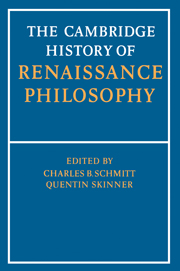Book contents
- Frontmatter
- Introduction
- PART 1 THE INTELLECTUAL CONTEXT
- PART 2 PHILOSOPHY AND ITS PARTS
- 6 Logic and language: Traditional logic
- 7 Logic and language: Humanistic logic
- 8 Natural philosophy: Traditional natural philosophy
- 9 Natural philosophy: The new Philosophy of nature
- 10 Natural philosophy: Astrology and magic
- 11 Moral philosophy
- 12 Political philosophy
- 13 Psychology: The concept of psychology
- 14 Psychology: The organic soul
- 15 Psychology: The intellective soul
- 16 Metaphysics
- 17 Problems of knowledge and action: Fate, fortune, providence and human freedom
- 18 Problems of knowledge and action: Theories of knowledge
- 19 Problems of knowledge and action: Epistemology of the sciences
- 20 Philosophy and humanistic disciplines: Rhetoric and poetics
- 21 Philosophy and humanistic disciplines: The theory of history
- PART 3 SUPPLEMENTARY MATERIAL
- Biobibliographies
- Bibliography
- Index nominun
- Index rerum
- References
6 - Logic and language: Traditional logic
from PART 2 - PHILOSOPHY AND ITS PARTS
Published online by Cambridge University Press: 28 March 2008
- Frontmatter
- Introduction
- PART 1 THE INTELLECTUAL CONTEXT
- PART 2 PHILOSOPHY AND ITS PARTS
- 6 Logic and language: Traditional logic
- 7 Logic and language: Humanistic logic
- 8 Natural philosophy: Traditional natural philosophy
- 9 Natural philosophy: The new Philosophy of nature
- 10 Natural philosophy: Astrology and magic
- 11 Moral philosophy
- 12 Political philosophy
- 13 Psychology: The concept of psychology
- 14 Psychology: The organic soul
- 15 Psychology: The intellective soul
- 16 Metaphysics
- 17 Problems of knowledge and action: Fate, fortune, providence and human freedom
- 18 Problems of knowledge and action: Theories of knowledge
- 19 Problems of knowledge and action: Epistemology of the sciences
- 20 Philosophy and humanistic disciplines: Rhetoric and poetics
- 21 Philosophy and humanistic disciplines: The theory of history
- PART 3 SUPPLEMENTARY MATERIAL
- Biobibliographies
- Bibliography
- Index nominun
- Index rerum
- References
Summary
LOGIC 1350–1600
The study of Aristotle
The Organon of Aristotle played a central role throughout the period, at least in principle. During the medieval period, the Organon was divided into two parts. The Categories and the De interpretatione along with Porphyry's Isagoge formed the Logica vetus, which was already known in the twelfth century. The Prior and Posterior Analytics, the Topics and the Sophistici elenchi formed the Logica nova, which became known only during the twelfth century. Both the Logica vetus and the Logica nova were firmly embedded in the university curriculum, with the single exception of the Topics. It was not included in the list of books prescribed by the Vienna statutes of 1389 or in the list of books read at Erfurt in 1420, and at Greifswald in 1456 it was to be lectured on only for the master's degree, although at all these places the other books of the Organon were specifically mentioned as part of the undergraduate course. In many places, including Paris, only four books of the Topics were to be read; and it was sometimes specified that these books were to be I, II, VI and VIII. An obvious result of humanist influence in the sixteenth century was the renewed attention paid to the Topics, though this interest was not to last.
There were several waves of commentaries during the period after 1350. Some of these were on individual books from the Organon, such as the commentary on the Prior Analytics by Marsilius of Inghen, which was published in Venice in 1516, and the commentary on the Posterior Analytics by Paul of Venice, which had been published seven times by 1518, nearly always in Venice.
- Type
- Chapter
- Information
- The Cambridge History of Renaissance Philosophy , pp. 139 - 172Publisher: Cambridge University PressPrint publication year: 1988
References
- 2
- Cited by

